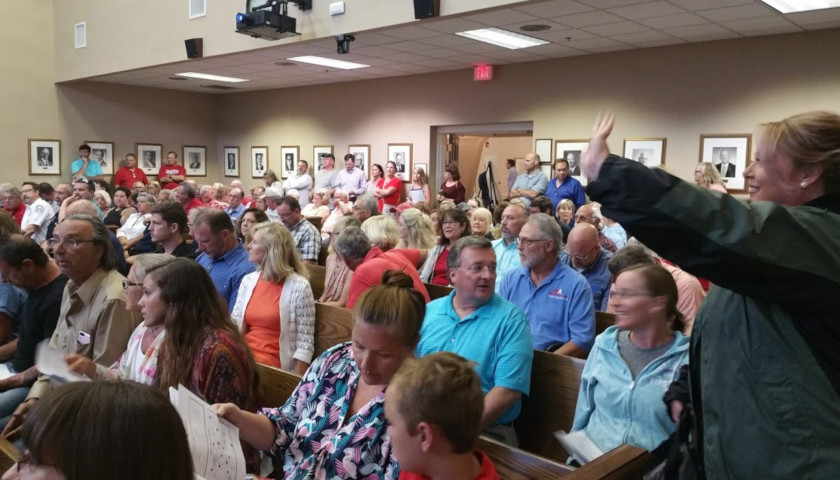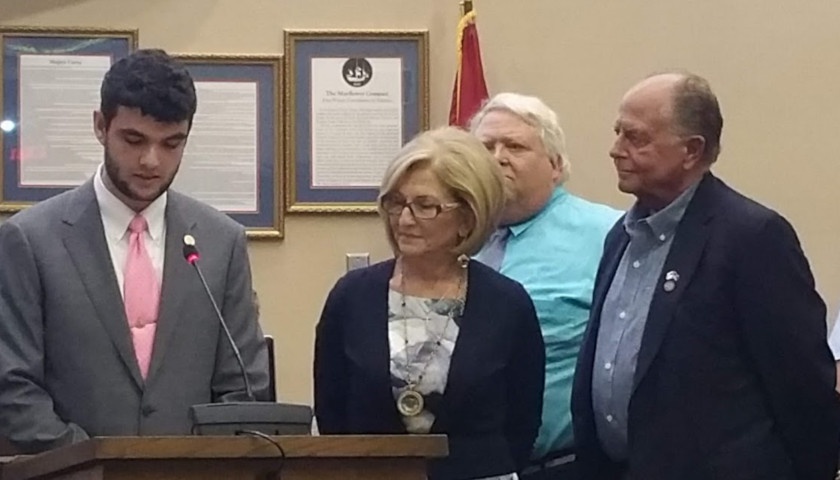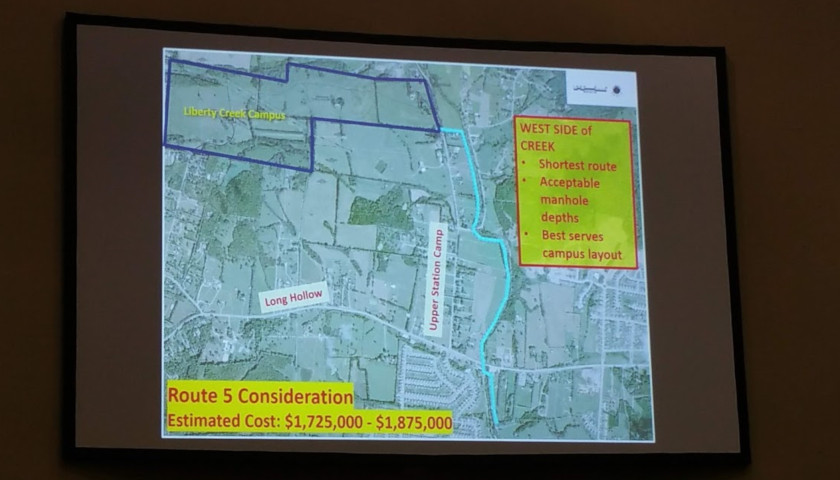

GALLATIN, Tennessee – More than 200 citizens turned out for the regularly scheduled meeting of the Sumner County Board of Commissioners Monday night to have their say on a planned greenway and sewer line as well as a property tax increase included in the budgets proposed for fiscal year 2019-2020.
Two major and contentious issues on the Sumner County Commission’s meeting agenda – a greenway that would sit atop a to-be sewer line that will cut right through the properties of several owners and a tax-increase for the upcoming fiscal year – have driven citizens to action.

As reported by The Tennessee Star, in the picturesque and rural Upper Station Camp Creek area north of Long Hollow Pike, County Executive Anthony Holt planned to use eminent domain to install a sewer line to a new 265-acre elementary-middle-high school campus right through the properties of residents in the area. The sewer line would have a sidewalk of sorts on top of it, creating a new section of greenway to connect to the existing Lower Station Camp Greenway.
Residents in the area only recently found about the condemnation of their property for the sewer line and attached greenway, even though the process has been underway since 2016, according to the County’s Law Director at a committee meeting on June 3.
The residents took issue with the fact that they would still have to pay for the taxes, maintain the property and be responsible for any users’ injuries or damages that occurred on their property as a result of Sumner County making their private land open for public use.
Over the course of the last several weeks, affected residents as well as two out-of-district County Commissioners, Jeremy Mansfield (District 11) and Moe Taylor (District 1), unable to get answers from Sumner County officials, have conducted their own research. Their research has revealed numerous inconsistencies relative to what they have been told are requirements related to the greenway and the sewer line.
Meanwhile, the budgets for fiscal year 2019-2020, which begins on July 1, are going through the development and approval process, prior to final approval by the County Commission.
Additionally, 2019 is a property reappraisal year for Sumner County, which is on a five-year cycle for the statutorily required process. Once the reappraisal process is complete, a Certified Tax Rate, which is revenue neutral to the jurisdiction, will be set by the Assessor of Property and reviewed by the State Board of Equalization.
Based on the budget documents available to date for Sumner County General Operations and Sumner County Schools, as well as overviews presented on those budgets, the County Commission intends to exceed the revenue neutral certified tax rate by better than 10 percent.
As The Star reported, the last time that a property tax increase was put in place was in 2014 following the last five-year reappraisal. The increase – a hefty 20 percent – was approved by a majority of the Sumner County Commission at a special Budget Committee meeting followed by a County Commission meeting.
Since then, annual budgets have increased between three and four percent year-over-year and actual revenues have exceeded the budgeted revenues by another 50 percent.

The proposed budgets for the upcoming 2019-2020 fiscal year on the agenda for the June 17 County Commission meeting include, in most cases, significant increases to each of the County General departments, an additional 26 new full-time employees, $1 million for a seven-acre parcel of land for the school system and a $3.5 million allocation to renovate what is known as the Comer Barn on Nashville Pike.
The Comer Barn was deeded to Sumner County in 2016 by Rogers Group Inc., the largest privately-owned road material supplier, under the conditions, among others, that the unsafe and collapsing structure be renovated to the private company’s satisfaction within five years and operated on a regular basis, or the company could re-take control of the property. The intention is for the renovated Comer Barn to be used as an event center.
Meanwhile, Sumner County’s 13 volunteer fire departments that provide rural fire protection and assist with other emergency calls anywhere in the county, were completely defunded of the $312,000 contribution made last year.
Prior to the start of the June 17 County Commission meeting, the chambers were standing room only with an overflow crowd into the Sumner County Administration Building’s foyer. In addition, more than two dozen attendees signed up to speak during the “recognition of the public” portion of the agenda.
Before addressing the controversial topics on the agenda, certificates of recognition were bestowed upon 11 high school valedictorians and Congressman Diane Black, who formerly represented District 6, encompassing her home of county of Sumner.
In hopes of addressing some of the concerns of the property owners affected by the installation of the sewer line through eminent domain, presentations were given by the project engineer, Jim Harrison, P.E. of Civil Site Design Group; Karen Harrison, partner at Water Management Services, LLC; and Pat Harrell, White House Utility District.
The presentations, followed by a question-and-answer session between the County Commissioners and the presenters, went for more than an hour before a 15 minute recess was taken.
Upon returning from the recess, Commission Chairman Scott Langford, whose day job is the assistant director of Sumner County Schools, reminded attendees that the time limit for speaking is five minutes and that Commission rules dictate that all comments are to be addressed to the Chairman and are not to be disparaging to any elected official or citizen.
The speakers were a mix of Sumner County residents from both the affected and non-affected area of the greenway/sewer, although nearly all addressed that issue as well as the budget. At least four of the speakers addressed the funding of the volunteer fire departments, including two of the 13 chiefs.
When Kyle Robinson, one of the property owners in the area affected by the greenway/sewer line and a primary spokesperson for the group, began to run over his five-minute allotment, Commissioner Moe Taylor made a motion for the rules to be suspended to allow Robinson an additional eight minutes to finish his comments, to which there were no objections.
The last speaker was owner of the local business Epic Event Center, Chef Christopher, who spoke passionately about the possibility of a government-owned event center which, being taxpayer funded, he would be unable to compete with.
While the speakers offered a variety of facts, figures and perspectives on the budget and the greenway/sewer line issue, none supported the current proposals being put forth by the County Commission.
After more than an hour and a half of citizen comments and about an eight minute recess, the Sumner County Commission continued with their business, next taking up the item of the reappraisal cycle.
For more than two months, the issue bounced back and forth between committees and the full County Commission and with the Assessor of Property. In the year of a reappraisal, which 2019 is for Sumner County, the county legislative body must approve a plan presented by the Assessor of Property for the next reappraisal. After an initial unanimous approval by the Legislative Committee of continuing the current five-year reappraisal cycle, the item appeared on various agendas as changing to a four-year cycle also available to counties in the state as are six-year cycles.
Once the issues of the reappraisal cycle, budgets and greenway/sewer line began getting increased public attention, the five-year reappraisal cycle sailed through votes by the County Commission, and the Legislative Committee prior to that, unanimously and without discussion.
Following along the agenda, the County Commission then took up the issue of the greenway/sewer line, addressing a proposed resolution that came out of the Legislative Committee meeting a week prior that stated that “this body hereby remove(s) any future expenditures for the greenway for Upper Station Camp to the new school site and ask(s) that WHUD (White House Utility District) seek the least invasive route to access these sewer and water lines.”
One of the subject district’s Commissioners, Leslie Schell, immediately proposed an amendment to the resolution that would make the easement exclusive to sewers, remove access from Long Hollow Pike to a specific owners’ property and specify the use of a “load support system” called Geoweb, included in the earlier presentation by the project engineer, as an alternative to the paved greenway or access road.
Commissioner Jeremy Mansfield delivered comments to his fellow Commissioners asking if it was obvious to them that the citizens feel that the proposed sewer line in their backyards is “an egregious abuse of eminent domain in order to provide a taxpayer funded amenity to profit private development.”
Referencing a video from about two years prior during discussion of a Long Hollow Corridor plan, Mansfield quoted the former Sumner County Planning Director who said that the development of that area will ultimately be dictated by the sewer.
Based on independent research conducted by himself and others, Mansfield relayed that the size, type and location of the proposed sewer line are inconsistent with serving only the new school campus, but is indicative of servicing future residential development.
Recapping the body’s legislative history on the item, Mansfield said that the biggest problem the Commission faces is that “this sewer project and land condemnation moved forward improperly, if not even illegally,” and called for the issue to be brought forth the right way and in an open and transparent manner.
Mansfield went on to cite the numerous inconsistencies in the information provided by Sumner County officials when compared with information from the White House Utility District, an independent engineer and a representative from Metro Nashville Public Works.
After about an hour of discussion dominated by Commissioner Mansfield, Commissioner Larry Hinton said he was not comfortable wrapping up the topic that night with all of the issues raised and made a motion to refer the item back to committee.
After further discussion, the amended resolution went on to be passed by the Sumner County Commission by a vote of 20-3, with Commissioners Moe Taylor, Jeremy Mansfield and Merrol Hyde voting no and Commissioner Alan Driver absent.
Mansfield stated his concern that, based on estimates he received, it could cost homeowners up to $40,000 to tie into the sewer line, which may be forced upon them by Tennessee Department of Environment and Conservation (TDEC). He wanted to include a provision that Sumner County would cover the cost of any future connections to the sewer line by those whose property was being taken by eminent domain.
To address Commissioner Hinton’s motion that was later withdrawn, the County Law Director said she would add the item to the agenda of the next General Operations Committee meeting, which usually meets the first Monday of each month.
About five and a half hours into the meeting, the discussion on the budget began, following a presentation by the Sumner County Finance Director and Budget Committee Chairman Chris Taylor. The presentation sought to justify an $0.1831 or 10.45 percent property tax increase in order to compensate for reappraisal appeals, a value yet unknown, as well as making up for the previous five years’ inflation.
The presentation also showed a history of median household income in Sumner County and that property tax relief is available for seniors, implying that a property tax increase was affordable for county taxpayers.
Commissioner Moe Taylor made the first move with a motion to add in last year’s funding of $312,000 for the volunteer fire departments, removing the $3.5 million for the Comer Barn renovation and removing $1 million from the Sumner County Schools budget for a land purchase.
The motion ended up being amended for various reasons, including a motion by Commissioner Paul Goode to increase the funding to the volunteer fire departments to $450,000.
Every $450,000 of additional spending, like the funding for the volunteer fire department, will add an additional penny to the property tax increase. This fact put commissioners committed to not increasing property taxes between remaining firm to that position and funding the volunteer fire departments, which was referred to as “holding the volunteer fire departments hostage.”
After meeting for nearly six and a half hours, Commissioner Loren Echols who sought to do only what was necessary with regard to the budgets, made the motion to table the 2019-2020 budgets for the next monthly County Commission meeting. As such, continuation budgets maintaining the funding at the 2018-2019 levels were approved
The meeting, at a little over six and a half hours, was the longest running since January 2015 when hundreds of taxpayers turned out in protest to the 20 percent property tax increase put into place by the Sumner County Commission in November 2014, had 760 live viewings in addition to the more than 200 in attendance.
Commissioner Moe Taylor told The Star about the attendance at the meeting, “That’s what happens when you have informed citizens who know what’s not in their best interests.” Commissioner Taylor also expressed concern that not everything that was obviously pre-planned to happen at the meeting appeared on the agenda.
Commissioner Jeremy Mansfield expressed grave concerns about the greenway and sewer line, saying that it was done improperly if not illegally and based on a false narrative and false information.
Regarding substituting the Geoweb vegetative product for the paved greenway to cover the sewer line, Mansfield said that it would require having crushed gravel under it, thereby making the foundation for a greenway. As such, Mansfield called it a trick, ruse and Trojan horse that if put down, “can always be condemned later for a greenway.””
Mansfield also said of the sewer line itself, that there are three options, although only one was pursued and then a narrative about that one was used to “trick everybody.” Mansfield added, “Stealing easements from homeowners in order to do it makes it even more sickening.”
The option of a step system or “sequencing batch reactors,” which would allow the septic treatment to be contained within the 265-acre three-school campus, was not considered or evaluated for cost or effectiveness.
Videos of the Sumner County Commission meetings can be watched here, although the video from the June 17 meeting is not yet available.
Laura Baigert is a senior reporter at The Tennessee Star.